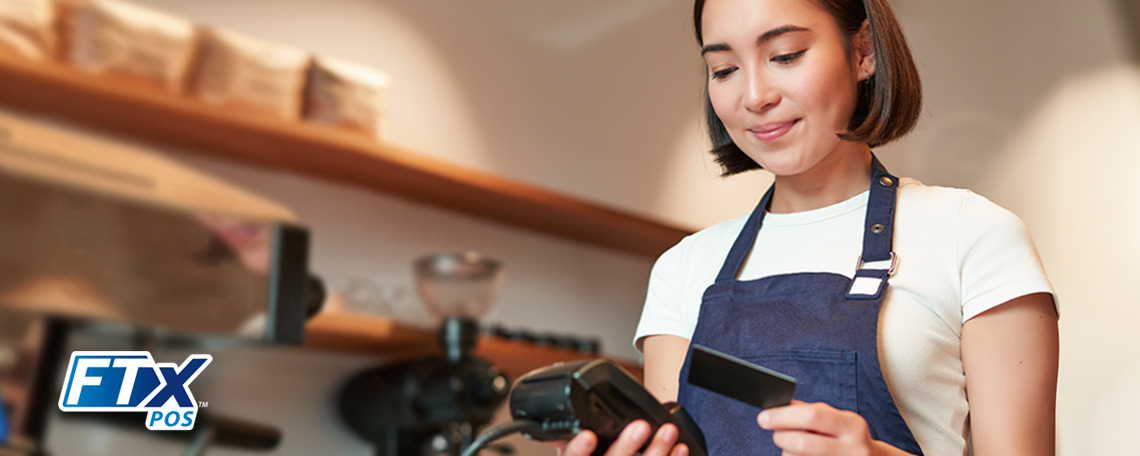
POS System Credit Card Processing: Without vs. Built-In
Feb 17, 2026 | 11 Min Read
It isn’t easy to run a successful liquor store, and handling credit card payments can often feel like navigating a minefield. With credit card processing fees consuming anywhere from 1.5% to 3.5% of a business’s revenue, liquor store owners face an even steeper challenge due to their high-risk status.
Despite this, not all payment processors offering services to high-risk liquor store merchants charge exorbitant fees.
This guide will walk you through everything you need to know about liquor store card payment processing, offering strategies to help you negotiate better rates and keep more of your hard-earned money.
Stick around until the end for some savvy tips and tricks to score better liquor store credit card processing rates! Cheers to saving!
Running a liquor store is already challenging, and being labeled as high-risk by payment processors adds to the difficulty. But what does being high-risk mean? It means your business has a higher chance of chargebacks and fraud, making payment processors cautious.
While this label might seem like a burden, it also offers benefits like specialized services tailored to your needs.
They provide custom solutions specifically designed for high-risk businesses, ensuring they have the tools and support needed to thrive in a challenging environment.
The customer support teams of specialized services are highly knowledgeable in high-risk industries, offering expert guidance and assistance tailored to the unique needs of these businesses.
They employ strong security measures to prevent fraud and chargebacks, safeguarding your business with cutting-edge technology and proactive monitoring.
A payment gateway and a payment processor might sound similar, but they’re quite different. A payment gateway is the technology that captures and transfers payment data from the customer to the payment processor.
On the other hand, the payment processor is the company that handles the transaction, ensuring the funds move from the customer’s bank to your merchant account.
For in-store purchases, the payment gateway works with point-of-sale (POS) systems to process transactions seamlessly.
When selling online, the payment gateway securely handles customer information and processes the payment.
FTx POS offers both payment processing and payment gateway solutions specifically designed for liquor store retailers. Our system provides seamless transaction handling, ensuring quick and secure payments for both store owners and customers, enhancing the overall shopping experience.
Liquor stores require specialized credit card processing due to their high-risk status, which is often attributed to age restrictions, regulatory compliance, and higher potential for chargebacks.
This type of processing differs from traditional retail in several ways:
High-risk payment processors offer services tailored to mitigate the risks involved in selling alcohol. These services include chargeback protection, compliance assistance, and specialized customer support.
Security is paramount when dealing with high-risk transactions. High-risk processors implement additional security measures to protect your business from fraud and chargebacks.
High-risk payment processors often provide more flexible solutions, including faster payout cycles and customized rates based on your business needs.
A merchant account is a type of bank account that allows businesses to accept credit card payments, facilitating smoother transactions and expanding payment options for customers. While some payment processors require businesses to have a merchant account, others do not.
However, having a merchant account can offer additional benefits like faster payouts, better fraud protection, and detailed transaction records. These features can be crucial for maintaining cash flow and ensuring secure operations.
Let’s face it, traditional credit card processors just aren’t built for the realities of running a liquor store. You need a partner who understands your industry, not one that throws unexpected roadblocks your way.
Here’s how traditional processors can cause headaches for your business:
Sudden Shutdowns
Traditional processors can unexpectedly terminate your account, leaving you without a way to accept credit cards and scrambling to find a new solution. This can disrupt your sales and frustrate your customers.
Cash Flow Freeze
They might hold your hard-earned funds for extended periods due to vague compliance reasons. This can tie up your cash flow and make it difficult to manage your business operations.
Specialized Needs, Ignored
Traditional processors may not have the experience or support system to address the specific challenges faced by liquor stores. This can leave you feeling lost and frustrated when you need help.
Get Started. Choose a liquor store POS system with integrated payment processing or use our third-party processing solutions. We will meet – or beat – your current card processing rates.

Running a liquor store involves unique considerations, and payment processing is no exception. Here’s what to expect:
Transaction Fees: Payment processing fees for liquor stores might be higher than for other businesses due to the industry’s specific risk factors.
Reserve Accounts: Some processors might require a reserve account to safeguard against potential chargebacks. This account holds a portion of your sales for a set period.
Payout Schedules: Payouts from processed transactions might occur less frequently, often weekly or biweekly, compared to daily settlements in other industries.
Application Scrutiny: Liquor store applications might undergo a more thorough review due to industry regulations and potential fraud risks.
Chargeback Management: Processors might have stricter thresholds for acceptable chargebacks. Exceeding these limits could lead to account termination or penalties.
Processing credit card payments is essential for your liquor store, but fees can eat into your profits.
Traditional retail processing rates usually fall between 1.5% and 3.5% per transaction.
But if you’re dealing with high-risk processing, expect it to be a bit steeper, generally between 3.49% and 3.95% per transaction. This bump is due to the higher risk of fraud and chargebacks. Essentially, high-risk rates can be 0.5% to 1% higher than usual ones.
The good news? With the right strategies, you can reduce these costs.
Here’s how to secure the best processing rates for your business:
Be prepared to discuss your processing needs and current rates with your existing processor. Mention the quotes you received from competitors. Processors are often willing to negotiate to retain your business.
Don’t settle for the first offer you get! Compare rates from multiple providers. You may find a better deal.
Maintain low chargeback rates and implement easier return policies to make your business more attractive to processors.
Ensure your business complies with all relevant regulations to reduce perceived risk.
Demonstrating financial stability can also help in securing better rates.
Want a better rate? Schedule a call now for a free card processing quote. We specialize in high-risk retail. Let us help you keep more of your profits.
FTx POS offers powerful, secure solutions for liquor store credit card processing, tailored to meet your specific needs. Whether you prefer seamless POS integration or our reliable third-party processing, we prioritize the security of your transactions and your customers’ information.
Here’s how we can help you unlock growth:
We understand the liquor industry’s potential for fraud. That’s why we offer competitive rates specifically designed for high-risk businesses, so you don’t overpay.
No more waiting weeks to see your hard-earned profits. FTx POS boasts fast payout cycles, getting your money back in your hands quickly.
Already using a processor? We’re confident we can offer better rates. Bring us your current statement, and we’ll match or beat it!
FTx POS integrates robust security measures to minimize fraudulent transactions, protecting your business from costly chargebacks.
Take your business online! Our system integrates seamlessly with your POS for in-store pickup or delivery options, expanding your reach to new customers.
Ready to take the next step? Contact FTx POS today and discover how we can help streamline your payment processing and boost your bottom line. Let’s get you started with a consultation and demo!
The fees can vary depending on the payment processor, but typically there is an initial setup fee, a monthly statement or gateway fee, and a per-transaction fee based on the total amount processed.
Some processors may also charge additional fees for services such as chargebacks or customer support.
Yes, most payment processors offer integrations with POS systems used in the liquor industry.
This allows for faster and more accurate transactions since all sales data can be automatically synced with the POS system. It also eliminates the need for manual entry and reduces the risk of human error.
Some processors may even offer additional features, such as inventory management and customer analytics, through their integrated platform. This can help liquor store owners better understand their sales trends and make informed business decisions.
Consider factors such as pricing, contract terms, equipment requirements, customer support availability, and security measures when evaluating different providers.
Research reviews and ratings from other business owners to get a better understanding of their experiences with different providers.
Yes, most liquor stores accept credit cards as a form of payment for alcohol purchases.
However, it's important to note that some states may have laws or regulations in place that restrict the use of credit cards for purchasing alcohol. These regulations can vary significantly, and it’s essential to be aware of local laws to ensure compliance.
Always consult state regulations to understand any specific restrictions that may apply.
It is important to follow PCI (Payment Card Industry Data Security Standard) compliance guidelines and regularly update your payment processing software to ensure the security of credit card transactions.
Additionally, training employees on proper handling and protection of customer information can help prevent any potential breaches or fraudulent activity.
Choosing a reputable payment processor with strong security measures in place can also provide peace of mind for both merchants and customers.


Feb 17, 2026 | 11 Min Read

Feb 17, 2026 | 13 Min Read

Feb 17, 2026 | 14 Min Read